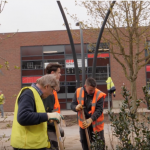 Ok this is good to read. Some pretty strong words I think. They are from Forrester and I read it in their newsletter of today. And it is not just about social computing. Look at bullet number 2 about experiences. Great how they integrate experiences in the Social Computing definition. Wow and read those other tenets! I like them. Oh and the graph you see here on the left is also from this emailnewsletter.
Ok this is good to read. Some pretty strong words I think. They are from Forrester and I read it in their newsletter of today. And it is not just about social computing. Look at bullet number 2 about experiences. Great how they integrate experiences in the Social Computing definition. Wow and read those other tenets! I like them. Oh and the graph you see here on the left is also from this emailnewsletter.
“Blogs, RSS, podcasting, open source, wikis, mash-ups. What — if anything — should companies make of these new technologies? Can they provide any real value? Forrester believes the answer is yes. The technologies themselves may come and go, but taken as a whole, this new wave of collaborative technologies will reshape our society and your company. Forrester calls the movement created by these collaborative technologies Social Computing — a new social structure in which technology puts power in the hands of communities, not institutions. Social Computing is transforming the Internet, the economy, and society. Inexpensive devices that cheaply and easily connect to the Internet allow increasingly socially motivated consumers to link up with each other more than ever before.
This convergence of social and technology factors — which allows consumers to communicate, create content, and share ideas — has many forms, including blogs, RSS, social networking sites, and podcasts.
Three tenets will define Social Computing and alter the interactive landscape that lies between consumers and institutions:
1) Innovation will become a bottom-up process driven by communities (à la Apple’s iPod shuffle);
2) institutions’ value will shift from the products they offer to the experiences they facilitate;
3) the communities that helped drive innovation will take power from institutions. Depending on your role, Social Computing will have different implications for you.”
Forrester has also just released a research report on social computing. It is about how networks erode institutional power, and what to do about it. Here is the executive summary. I put it here not just for you to know about the research report, but more because it is good to read in the context of this topic. And I read a lot of : user in control, upstream thinking and new leadership.
“Easy connections brought about by cheap devices, modular content, and shared computing resources are having a profound impact on our global economy and social structure. Individuals increasingly take cues from one another rather than from institutional sources like corporations, media outlets, religions, and political bodies. To thrive in an era of Social Computing, companies must abandon top-down management and communication tactics, weave communities into their products and services, use employees and partners as marketers, and become part of a living fabric of brand loyalists.”
Some conclusions:
– Technology embeds itself in social behaviour
– Technology brings power to the masses
– Social trends fuel technology’s changing role
– Creating value means relinquishing control
Some recommendations:
– Marketers and strategists: listen more, talk less
– IT: make social computing a strategic asset
– Vendors: build communities into your Products
What it means:
– Truth, identity, and reality are tough to find (the pollution of the commons)
Update: I found a map of Forrester Research about Social Software on MarketingFacts. You can find it under the Continue line.
Technorati tags: social computing, experience










Uiterst relevant rapport dat de verschillende ontwikkelingen in co-creationaire context weergeeft, denk je niet Hans?
what is the difference between air cleaner and air filter
what is the difference between air cleaner and air filter